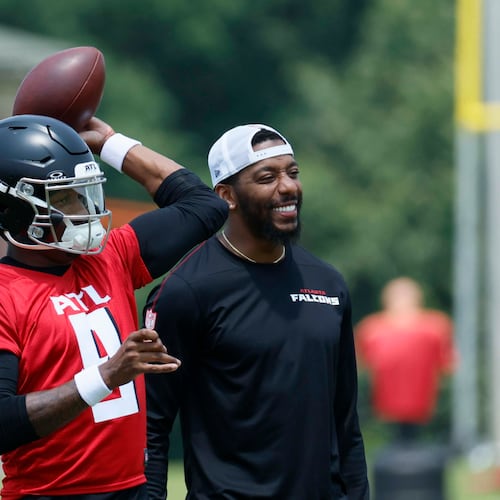Mayor Kasim Reed's Office of Communications Director Sonji Jacobs released the following statement Tuesday in response to an AJC PolitiFact investigation that ruled "false" Reed's statement about the spending limit for the new Falcons stadium site. AJC's PolitiFact Georgia stands by its original fact check.
Statement from the Office of Mayor Kasim Reed on Today's AJC's PolitiFact Ruling
ATLANTA --- The Atlanta Journal-Constitution today published a PolitiFact column declaring that Mayor Kasim Reed was incorrect in stating that Georgia law limits state entities to paying fair market value for public property. The column is incorrect and misleading.
In fact, Mayor Reed's comment accurately reflects the legal limitations under which the State of Georgia/Georgia World Congress Center Authority (GWCCA) is acting in regards to the sale of Mount Vernon Baptist Church and its appraised value of $6.2 million. His statement was based on an accurate reading of the Georgia Constitution, his experience as a both an attorney and state lawmaker for 11 years, and a standing opinion of the Office of the Attorney General.
Specifically, Mayor Reed said: "State law says that once the state appraises a piece of property, they can only pay it a certain amount above appraisal." The PolitiFact writer opined: "Our research found no laws establishing this limit."
PolitiFact's logic could not be more flawed. First, the Georgia Constitution is the supreme law of the state. Second, opinions that interpret the Constitution from the Office of the Attorney General remain valid until withdrawn or the law is changed, regardless of the number of years since they were written. As such, state lawmakers and the Office of the Attorney General have interpreted the Gratuities Clause of the Georgia Constitution for decades as limiting the state to paying fair market value for property, absent some additional source of value that the state receives from the transaction.
"State lawmakers view the clause as a vital safeguard of the state's taxpayers; it ensures that tax dollars won't be just given away based on favoritism or political connections; instead, tax dollars can only be spent when the state gets full value for those dollars," wrote Attorney General Sam Olens. He added: "Mayor Reed's comment was correct, and accurately reflects the legal limitations under which the State is acting in this matter."
In addition, the GWCCA has maintained this position since negotiations with Mount Vernon Baptist Church began. Although the PolitiFact editors chose to target Mayor Reed's comments, this position has been repeatedly put forth by the GWCCA throughout the entire stadium negotiation process and widely reported in multiple media outlets.
"As a state authority, the GWCCA is guided by the State Attorney General Office's in regards to real property acquisitions," said GWCCA Chief Operating Officer, Kevin Duvall. "The GWCCA has followed the legal parameters set forth and has been consistent and transparent in its approach."
The legal precedent and basis for Mayor Reed's comments are below:
- In order for a proposed transfer of state funds not to conflict with the Gratuities Clause in the Constitution, the State has to receive "a benefit . . . that is sufficiently substantial to avoid being an unconstitutional gratuity." --- Garden Club of Georgia v. Shackelford, 274 Ga. 653, 655 (2002).
- The Georgia Constitution provides: Except as otherwise provided in the Constitution, (1) the General Assembly shall not have the power to grant any donation or gratuity or to forgive any debt or obligation owing to the public --- Ga. Const. Art. III, § VI, ¶ VI; see 1997 Op. Att'y Gen. 97-6; 1995 Op. Att'y Gen. 95-25; 1980 Op. Att'y Gen. 80-67; 1971 Op. Att'y Gen. U71-17.
- 2004 Op. Att'y Gen. 04-3 describes the analysis of whether a particular activity violates the gratuities clause as follows: "… it is fair to say that the cited precedent and other reported cases and opinions require a good faith expectation, and primary motive, that the state will benefit in fair return for the cost or the value bestowed and further that the actual gratuitous activity and the function expected to benefit indirectly are expressly authorized by law, or are authorized by implication."
- 2004 Op. Att'y Gen. 04-3, p. 3…. "Thus, for a transaction in which the State buys real property or any other asset, an analysis has to be undertaken of whether the State is receiving a benefit in fair return for the cost and value bestowed upon the party selling the real property or other asset to the State. Obviously, the direct way to measure that fair return is to determine the fair market value of the property."
Full Statement from Georgia Attorney General Sam Olens:
While I read with interest PolitiFact columns, and commend the paper for this endeavor, today's PolitiFact, "Spending limit a best practice, not a state law," is incorrect and misleading.
The end of today's column reads: "Reed's statement is based on an interpretation of a portion of the Georgia Constitution, purportedly long-held best practices, and an attorney general's opinion on property leases that's almost two decades old…And our research found no laws establishing this limit."
The Georgia Constitution is the supreme law of our state. It is the law. Our office's Opinions interpreting the Constitution remain valid until withdrawn or the law is changed, regardless of the number of years since they were written.
The Gratuities Clause of the Georgia Constitution is a vital safeguard of the State's taxpayers. It ensures that tax dollars won't be just given away based on favoritism or political connections; instead, tax dollars can only be spent when the State gets full value for those dollars.
My office has interpreted this Clause for decades as limiting the State to paying fair market value for property, absent some additional source of value that the State receives from the transaction.
Mayor Reed's comment was correct, and accurately reflects the legal limitations under which the State is acting in this matter.
About the Author
Keep Reading
The Latest
Featured


